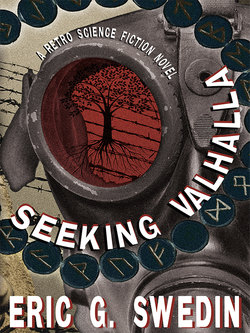Читать книгу Seeking Valhalla - Eric G. Swedin - Страница 11
На сайте Литреса книга снята с продажи.
ОглавлениеCHAPTER SEVEN
Carter was torn. He wanted to accompany his friend back to the medical corps at the battalion bivouac, but what about Aoife? The image of the big tree, the rings, and dried blood, kept intruding in front of his eyes.
Rapid orders followed. Carter took two men in the jeep. One of the trucks was to be driven down to the temple, and the rest of the men took the other truck to transport Napier back to the bivouac.
Carter normally let Napier drive the jeep—an annoying consequence of rank, because Carter really enjoyed being at the steering wheel. As a child he had ridden horses competitively, continuing a family tradition, leaning into the horse as if they were one organism as they jumped over poles and water. The jeep consumed gasoline, not hay, but its four-wheel drive was as versatile as a horse. Carter had seen lots of horses during this war, many of them dead or dying. Many farms in Europe still used horses, not tractors, and he had been surprised to find that both the Italian army and the German army still used horses. He had not seen a horse in either the American or British armies, except for a few in England that senior officers used for recreation. Perhaps this one insight told much about the industrial struggle of factory output between the Allies and the Axis and why the Allies were on the verge of victory.
As Carter drove by the temple to get to the other road, he found his Rangers laying out the dead Germans in a row. Now that spring had arrived, burying the dead quickly was always a good idea, before putrefaction turned the bodies all gooey.
A quarter of a mile up the second road, they came across the German truck. Carter stopped for a moment and stood up to get the lay of the land. Putting the jeep into gear, he drove around the truck, bumping over the rough ground and over a half-buried log, and accelerated as he regained the road. The trees rushed by faster, forcing Carter to concentrated on staying in the two brown ruts among the blur of green.
Ferro sat in the rear, with Carter’s carbine in his hands and his own rifle jutting up between his knees, its scope resting against his thigh in order to keep it protected and aligned. “You think that maybe you are going a little fast, sir?” the Italian from Boston asked.
“We need to catch them before the road meets some other road and we lose them.”
“What about mines, sir?”
Carter slowed for a moment. The standard tactic was to drive slowly enough to be able to see if the ground had been disturbed, which only worked if the mines had been recently laid. He hated mines, with a passion born of raw fear; six of his men had been maimed by them, and two others had died. In one of those sick twists of logic that war thrived on, antipersonnel mines were designed to wound and cripple, not kill. A wounded man delayed a military unit, as his comrades stopped to care for him and get him to medical attention, while a dead man did not slow the unit down. Of course, an antipersonnel mine would probably not wound them in the jeep, but roads didn’t have the small AP mines, they had bigger mines to destroy vehicles. Outside Cherbourg, he had seen a jeep hit an antitank mine. Not pretty. The mine had ripped up like a molten geyser from hell and left only charred metal and men.
“They wouldn’t have put a mine on this road,” Carter said as he pressed on the accelerator. “The Germans would have expected their squad to overrun us back at the temple, since they had the element of surprise. Mining this road would have just as likely have caught their own, as us.”
“Life ain’t logical, Major,” Ferro said. The soldier sitting in the passenger seat, his hands clutching the grips of his .30-caliber machine gun, nodded his agreement with Ferro. He was new to the unit, a greenhorn replacement brought in from the paratrooper pool. Carter could not remember his name. Carter understood that no one wanted to die in the last days of a war—where’s the fairness in that?
Carter responded with determined words. “We don’t have time to stop.”
